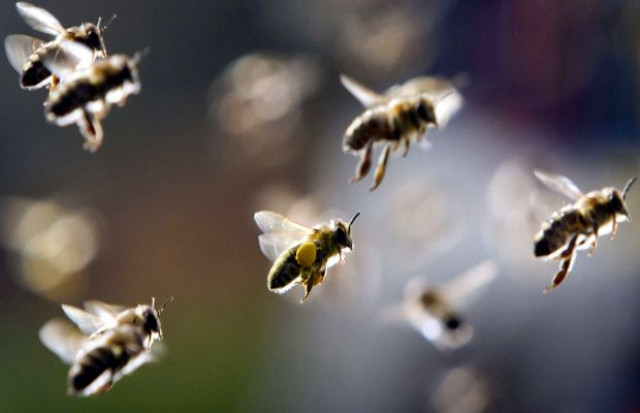Pooh Bear’s nightmare: Climate change a buzz-kill for bees
Honeybee Research Institute head says bee population, honey production under threat

PHOTO: AFP
This was said by National Agricultural Research Centre (NARC) Honeybee Research Institute (HBRI) Director Dr Rashid Mahmood in an interview on Tuesday. He said the present dry weather was affecting sowing of crops and if this weather remained the same, crops and other plant production would certainly suffer in rain-fed areas.
Honey production suffers as climate change causes sharp decline in bee population
“There will be less flowering in this situation and if crops and plant production suffers, honeybee production will also suffer “, he added. He said that the present weather condition had affected bees’ potential eggs production and the population.
In the early nineties, berry honey season used to last from mid-August to mid-October, because this was when the berry trees would flower. With the change of temperatures brought about by climate change, this season has been reduced to just one month, between mid-September and mid-October, he said adding that honey was a very precious commodity and was being used for many purposes.
Dr Mahmood said that if the rains occur soon and crop and plant production could be increased, it would increase flowering.
Flowering and pollen are the main sources of food for bees to produce honey. Due to the unavailability of pollen, the bee population reduced from eight-to-ten combs to just two-to-three combs. “Pakistan produces 10,000 metric tons honey every year and exports 1,650 metric tons, which contributes a reasonable amount to the national economy,” he added.
Man survives 500 to 1,000 stings by swarming Arizona bees
The Honeybee Research Institute at NARC is doing research on how to tackle climate change and its impacts on honeybees. “We are also experimenting on artificial diets which could be fed to the bees during the dearth period due to prevailing dryness in these days,” Dr Rashid remarked.
Published in The Express Tribune, November 23rd, 2016.



















COMMENTS
Comments are moderated and generally will be posted if they are on-topic and not abusive.
For more information, please see our Comments FAQ